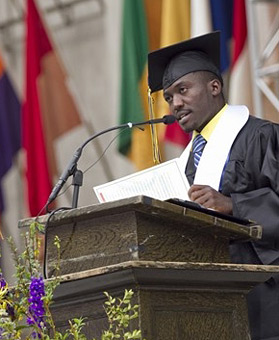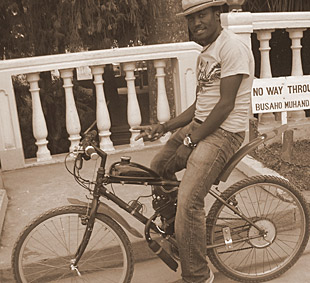Speaking from experience

COMPELLING: As a student speaker at Berkeley Engineering’s 2011 commencement, Christopher Ategeka (B.S.’11 ME) described his tumultuous childhood in Uganda as well as how he came to enroll at Berkeley. “Engineers make all kinds of differences in the world,” he told the audience, encouraging his fellow graduates to take on the problems of global poverty. DOUG CODY/BAY AREA EVENT PHOTOGRAPHY
As one of the student speakers at Berkeley Engineering’s commencement last month, Christopher Ategeka (B.S.’11 ME) recounted his formidable journey to Berkeley from the rural Ugandan village of his childhood.
His odyssey entailed unimaginable heartbreak and hardship. For Ategeka, who will return to Berkeley in the spring of 2012 to begin a doctoral program in mechanical engineering, luck as well as a positive outlook helped get him where he needed to go. There was one tool, however, that also played a pivotal role in his success: the bicycle.
“The experience of getting a bike changed my life,” he says.
The eldest of six siblings, Ategeka had lost both parents to AIDS by the time he was seven years old. What followed was a turbulent period of shifting from the care of one relative to another.
Life was hard, with school and his village located seven miles apart. But not long after his parents died, Ategeka was walking the long road home when a stranger stopped and offered him a ride on his bicycle.
“Ever since then I saw how powerful a bike can be,” he says. After giving him a ride home, the stranger left him with some memorable words:
“Life is like a bicycle,” the man said, quoting Albert Einstein. “In order to stay balanced, you have to keep moving.”
Ategeka took those words to heart. Every day, he walked barefoot to school. After making the return trip home in the dark, he would feed his siblings and do his homework.
“I had to keep this balance of things going,” he recalls.
Eventually, a family friend suggested he contact Youth Encouragement Services (YES), an American-run agency in Uganda. Through YES, Ategeka was matched with a sponsor family in Oakland who provided him with $25 a month in financial support.
One of his first purchases? A bicycle.
Ategeka’s life immediately took a turn for the better. “My ride to school was only 30 minutes. I could make it home before dark to find food for my siblings,” he says. “I spent my time studying, and my grades went up.”
With time to devote to his studies, he excelled at math and science and was able to attend a good high school. After graduation, his sponsor family paid for him to come live in California.
That was four years ago. As he left Uganda, Ategeka saw an airplane for the first time.

IT’S ALL ABOUT THE BIKE: Ategeka is returning to western Uganda to start his Pedal or Power project, which will teach village residents to build, refurbish and repair both motorized and non-motorized bicycles to be distributed to the needy. Energy-efficient and cost-effective, bicycles are a powerful resource for easing poverty, he says. COURTESY CHRISTOPHER ATEGEKA
“It blew my mind,” he says. “I looked around at this huge jet airplane and thought about the fact that a person can design a system that can continuously fly without overheating, without blowing up, and then land safely. I thought, ‘I am going to be an aerospace engineer.’”
Landing in San Francisco, he met his sponsor family for the first time.
“Because of whatever happened to me when I was young, I learned not to cry,” he remembers. “But that was a moment when ‘thank you’ was not enough.”
He enrolled in the Peralta Community College system and completed his lower-division coursework at Laney College. He also ran track for Merritt College, running up to 75 miles each week on the East Bay ridge trails. After graduating with highest honors from Laney College, he came to Berkeley as a transfer student in 2009.
At Berkeley he focused on mechanical engineering because of its applicability to so many fields. By studying combustion and heat transfer, Ategeka hopes to eventually work in aerospace or any number of other fields.
But first he is heading back to western Uganda. There he will launch Pedal or Power, a project to help Ugandans use local resources to build, refurbish and repair both motorized and non-motorized bicycles. Ategeka’s vision is to distribute the bicycles to needy village residents—including schoolchildren, farmworkers, healthcare workers and HIV/AIDS patients—and educate the recipients on bicycle usage, safety and maintenance. Eventually, the program aims to scale up to selling bikes to those who can afford them.
In a place where villages, schools and healthcare services are often far apart, bicycles can be important tools to improve the quality of life, Ategeka says.
He is one of five recipients of this year’s Judith Lee Stronach Baccalaureate Prize for Berkeley graduates, which granted him $25,000 to get the Pedal or Power project started. Chevron Corporation has since matched that award.
For Ategeka, this is an opportunity to return to where his journey started and give back. “There are so many other kids suffering in the world, and I wanted to do something,” he says. “People say there is no luck out there, and people say there is no love. [But] I think there is luck and love. That’s what is out there.”
